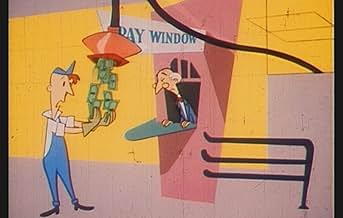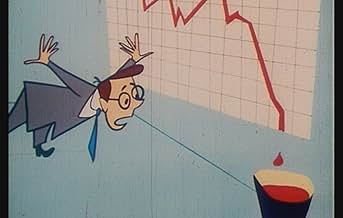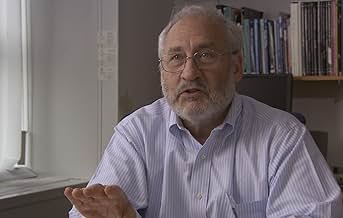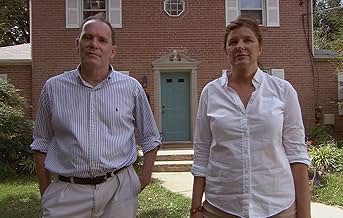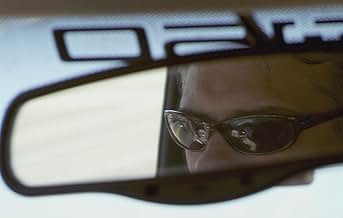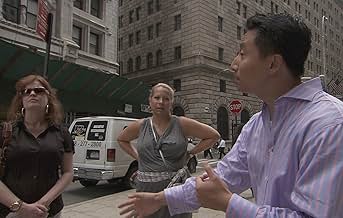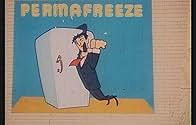अपनी भाषा में प्लॉट जोड़ेंAn examination of the causes of the economic crisis of 2008.An examination of the causes of the economic crisis of 2008.An examination of the causes of the economic crisis of 2008.
- पुरस्कार
- कुल 1 नामांकन
फ़ीचर्ड समीक्षाएं
"The capitalism in the last thirty years has decreased the standard of living for everyone except at the top."
This was the statement of Louis Hyman, an economic historian. I'm mentioning this statement because it was in respects to the more surprising issue behind the '08 financial collapse. Everyone heard the term "subprime mortgages" and everyone believed that that was the core issue behind the '08 financial collapse. What I never heard was "income inequality" which was mentioned in "The Flaw."
When wages stagnate for the poor and middle class, the only way an economy can keep humming is through borrowing and credit, i.e. Debt. When debt increases so does spending which increases the wealth of the top 10%. Debt can only increase by so much before defaults happen and then it all comes tumbling down. But, as Hyman pointed out, it begins with outrageous income inequality.
Of course, there were a lot of other factors mentioned for the '08 crisis: CDO's (Collateralized Debt Obligations), sector rotation, asset market, and more. This 80 minute documentary was very informative and educational. It's been fourteen years since 2008, but it still seems like only yesterday. Furthermore, the way home prices have skyrocketed in the last decade I can only wonder what will cause them to plummet again, and who/what will be to blame this time. Again it seems like the government is behind the curve on the economy and does too little too late.
Free with Amazon Prime.
This was the statement of Louis Hyman, an economic historian. I'm mentioning this statement because it was in respects to the more surprising issue behind the '08 financial collapse. Everyone heard the term "subprime mortgages" and everyone believed that that was the core issue behind the '08 financial collapse. What I never heard was "income inequality" which was mentioned in "The Flaw."
When wages stagnate for the poor and middle class, the only way an economy can keep humming is through borrowing and credit, i.e. Debt. When debt increases so does spending which increases the wealth of the top 10%. Debt can only increase by so much before defaults happen and then it all comes tumbling down. But, as Hyman pointed out, it begins with outrageous income inequality.
Of course, there were a lot of other factors mentioned for the '08 crisis: CDO's (Collateralized Debt Obligations), sector rotation, asset market, and more. This 80 minute documentary was very informative and educational. It's been fourteen years since 2008, but it still seems like only yesterday. Furthermore, the way home prices have skyrocketed in the last decade I can only wonder what will cause them to plummet again, and who/what will be to blame this time. Again it seems like the government is behind the curve on the economy and does too little too late.
Free with Amazon Prime.
1nwnz
Typical socialist/statist claptrap. Maoist propagandists would be proud.
4 is a generous rating.
This documentary spends too much time on inequity of pay. Frankly, if all pay increases, we don't care if someone else makes more.
The housing index adjusted for inflation from 1890 was interesting.
They pulled out tiny bits of Allen Greenspans congressional inquiry to make him look bad. They used it to cast doubt on capitalism without justifying or explaining what the actual failure was that caused the crisis.
Banks loaned to people who should never have qualified for the loans. Yes. But why!? Banks would never do that because it puts them at risk. Underwriters would never do this if they were free to make their best decisions.
This documentary makes it look like it's the banks who cooked up this idea to lend money to people without verifying income. That's false. Bill Clinton signed law requiring lending without checking. They wanted to NOT DiSCRIMINATE based on INCOME That is just stupid. Banks simply complied and then figured out a way to sell the unvetted loans... risk mitigation. It's exactly what any business would do when the government forces them into business practices that do not make financial sense.
This had a lot of potential to enlighten about the 2008 fall, but it failed. I would not recommend this to my kids or anyone for a big picture of the 2008 banking crisis. It had agenda toward equity instead of focusing on the actual laws and resulting compliance that caused it.
This documentary spends too much time on inequity of pay. Frankly, if all pay increases, we don't care if someone else makes more.
The housing index adjusted for inflation from 1890 was interesting.
They pulled out tiny bits of Allen Greenspans congressional inquiry to make him look bad. They used it to cast doubt on capitalism without justifying or explaining what the actual failure was that caused the crisis.
Banks loaned to people who should never have qualified for the loans. Yes. But why!? Banks would never do that because it puts them at risk. Underwriters would never do this if they were free to make their best decisions.
This documentary makes it look like it's the banks who cooked up this idea to lend money to people without verifying income. That's false. Bill Clinton signed law requiring lending without checking. They wanted to NOT DiSCRIMINATE based on INCOME That is just stupid. Banks simply complied and then figured out a way to sell the unvetted loans... risk mitigation. It's exactly what any business would do when the government forces them into business practices that do not make financial sense.
This had a lot of potential to enlighten about the 2008 fall, but it failed. I would not recommend this to my kids or anyone for a big picture of the 2008 banking crisis. It had agenda toward equity instead of focusing on the actual laws and resulting compliance that caused it.
The Flaw delivers the story of the causes of the financial crisis and what may have caused it. There is bias in this documentary but it isn't as overt as most documentaries. The great thing and the reason why I believe that everyone should watch this movie is that this documentary delivers a the information of the financial crisis in a format that is easy to digest and gives great visual representation of everything that lead up to the collapse. The flaw of The Flaw is that there are some stories and story lines that are personal to one or two people instead of a whole audience. These stories, in my opinion, are David Sington's attempt to elicit an emotional connection and reaction to what happened with the financial collapse. This makes the documentary feel more personal and allows the viewer to feel more connected to the issues. That said, that is part of what I am not a huge fan of with these types of documentaries. I personally would have rather just had the information and the graphs and charts showing what happened without the personal stories so that the movie wouldn't feel so biased. This is a good documentary that is a scant 78 minutes, has good information and is easy to get through.
Utterly fascinating and very well put together account of the true source of all that "bother" in 2008. Highly recommended. It would be wonderful to hope that we will learn lessons from this, but unfortunately human nature doesn't work like that. "Greed is good."
क्या आपको पता है
- कनेक्शनFeatures It's Everybody's Business (1954)
टॉप पसंद
रेटिंग देने के लिए साइन-इन करें और वैयक्तिकृत सुझावों के लिए वॉचलिस्ट करें
- How long is The Flaw?Alexa द्वारा संचालित
विवरण
- रिलीज़ की तारीख़
- कंट्री ऑफ़ ओरिजिन
- आधिकारिक साइट
- भाषा
- IMDbPro पर और कंपनी क्रेडिट देखें
- चलने की अवधि1 घंटा 18 मिनट
- रंग
इस पेज में योगदान दें
किसी बदलाव का सुझाव दें या अनुपलब्ध कॉन्टेंट जोड़ें



